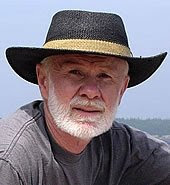Ten months ago I posted a memorial to a former professor of mine, Jerry O.Wolff. He was an ex-officio committee member of mine.  News in the animal behavior and small rodent research circles spread quickly about his apparent suicide in the Canyonlands National Park in Utah. His notes to relatives and friends stated he wanted to return his body and soul to nature and asked for no one to look for him and leave his body alone.
News in the animal behavior and small rodent research circles spread quickly about his apparent suicide in the Canyonlands National Park in Utah. His notes to relatives and friends stated he wanted to return his body and soul to nature and asked for no one to look for him and leave his body alone.  Being a strict ecologist, I can understand that wish. However, there was a big search for him that was unsuccessful. Jerry Wolff was a surprisingly rugged outdoorsman; and he obviously found a very remote place for his last moments. Just a few days ago, his remains were found. The truth is, his remains may have remained undiscovered if it weren't for another very experienced hiker who came across his body at a base of a cliff.
Being a strict ecologist, I can understand that wish. However, there was a big search for him that was unsuccessful. Jerry Wolff was a surprisingly rugged outdoorsman; and he obviously found a very remote place for his last moments. Just a few days ago, his remains were found. The truth is, his remains may have remained undiscovered if it weren't for another very experienced hiker who came across his body at a base of a cliff.
Most people who choose to end their lives in natural areas usually do so within a few hundred feet of major hiking or landscape entries. Could you imagine the horror and scarring of a young child who discovered a dead, decaying, insect/animal swarming body while on a family outing? I'm very glad Jerry chose a very private place to end his life. The account of the story can be accessed at the Star Tribune Newspaper of Minneapolis-St. Paul.
Thursday, April 02, 2009
Professor Jerry O. Wolff remains found
Subscribe to:
Post Comments (Atom)






















5 comments:
Interesting. I did not know Jerry, and I did not know of your connection.
Too bad the person who found his remains did not know who this was. The hiker could have just kept hiking along.
Wow! This news had completely slipped by me, Danielle. I actually met him at an NSF grant writing workshop several years ago and got some very good advice.
I can easily see how he must have been a tough man to work for - definitely intimidated many in our group during that workshop.
I'm stunned to read about this now. What a way to end a life.
Very sorry to hear this. Looks like the smartest and most thoughtful ones in the world are the most depressed because they see most clearly how callous and unthinking the rest of us are while casually destroying everything that is worth caring about and protecting.
Wow, unbelievable! And sad. I think I would be traumatized if I came upon a body, any body, I hate coming upon critters.
I worked for Jerry for two years at OSU. He was a significant influence he helped make my academic career possible. The last time I saw Jerry was a chance meeting on an airplane about five years ago and we had a great conversation. When I heard from a friend about Jerry's disappearance just a few days after it became public, I frantically started packing (since I lived only a few hours from Canyonlands) and researching in order to conduct my own search. Calls made to law enforcement, search and rescue, and park rangers eventually yielded a detail that stopped me in my tracks – Jerry paid for a shuttle to drop him off but not to pick him up. In a conversation with one of the rangers, he said that several people had told him that if Jerry didn’t want to be found he wouldn’t be found. I agreed with that statement and the ranger asked me why I agreed. I told him that Jerry had been a student of mammalogy his entire life and he had extensive knowledge of the olfactory capabilities Canis lupus familiaris. It was no surprise to me that the search and rescue dogs couldn’t follow Jerry’s trail. If he had gone to that much effort to cover his trail, I decided that I would respect his wishes and not try to follow. The hiker that found Jerry expressed his regret that Jerry’s final wish was not honored. I can only add this: A person should be able to live or die in any way they please as long as they do not harm others. I respect Jerry’s decision even if I don’t understand it. For myself, I have learned that suicide can affect the lives in others in ways we can’t even begin to imagine. Although there may come a time when I want to step out on the ice flow, the knowledge of the aftermath of Jerry’s decision will prevent me leaving my family with only questions, doubts, and a trail they cannot follow.
Post a Comment